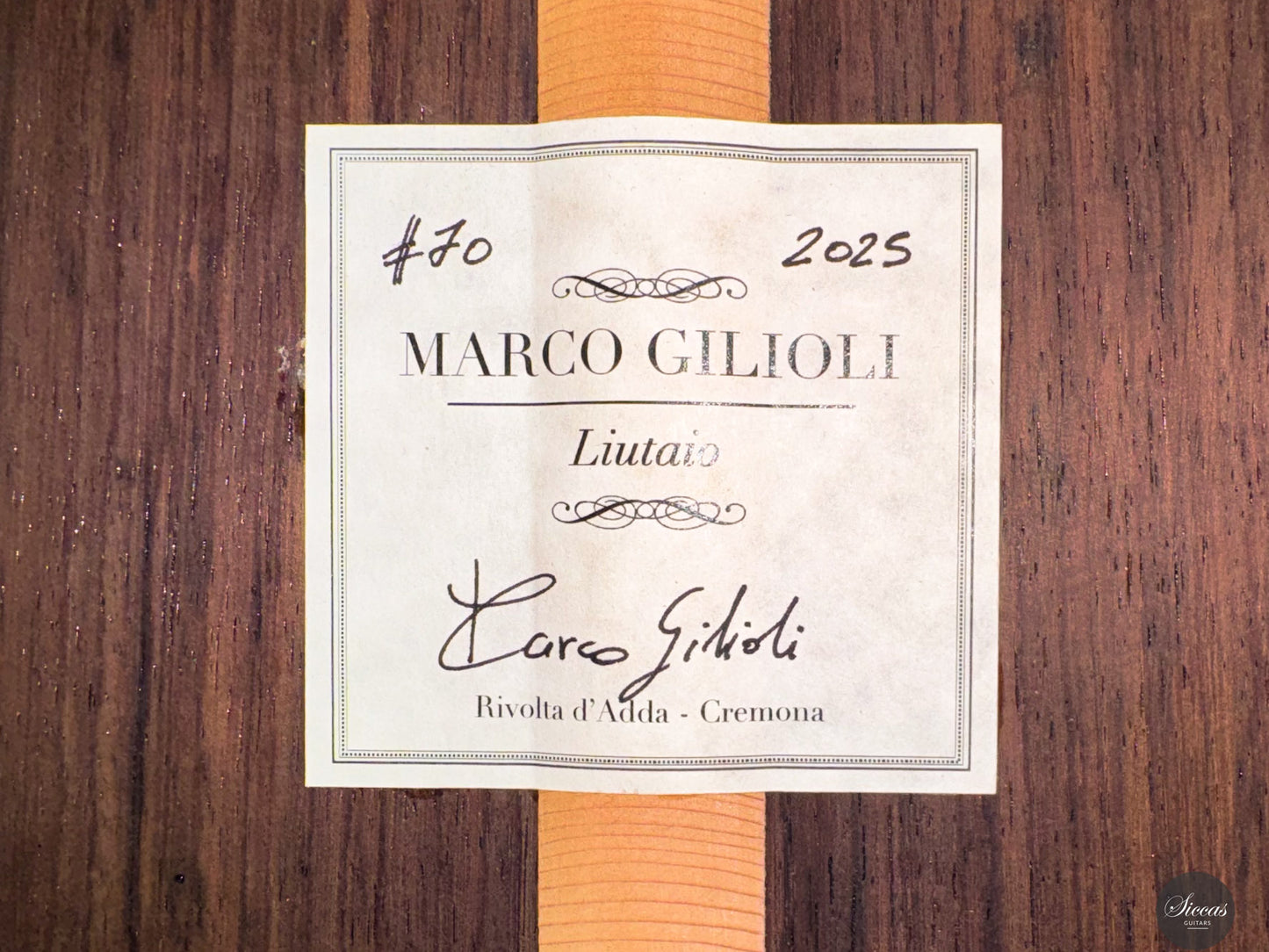Marco Gilioli - 2025 No. 70
Marco Gilioli - 2025 No. 70
Details
Details
Overview
Overview
Shipping important note
Shipping important note
Delivery times are typically reliable and most instruments arrive within the estimated timeframe.
Should any unexpected delay occur, our team will keep you informed and provide support at every step. For all shipping details and exceptions, please see our Shipping Policy.
Details about GPSR
Details about GPSR























Video overview


More details about the guitar
About the luthier
Marco Gilioli is a gifted Italian luthier based near Milan, whose instruments reflect a deep understanding of classical guitar aesthetics and performance. Trained in the Spanish tradition, Gilioli’s work blends tonal refinement with practical design, focusing not only on the voice of the guitar but on the comfort and responsiveness it offers to the player.
His guitars are celebrated for their soft, lyrical tone, clear trebles, and resonant basses, with a balance that remains consistent across registers. Marco places strong emphasis on projection and playability, ensuring that each guitar is not only beautiful to hear but easy to engage with — equally suited for advanced concert players and refined amateurs.
About the guitar
Guitar No. 70, built in 2025, is a traditionally constructed instrument that showcases Marco Gilioli’s maturing style and tonal sensibility. With a spruce soundboard and Indian rosewood back and sides, it delivers a warm, spacious tone rich in clarity and depth. The voice is especially notable for its expressive balance — the basses are deep and supportive, while the trebles sing with sweetness and precision.
The guitar’s refined dynamic response and tonal colors lend themselves beautifully to nuanced phrasing. Its resonance is open and natural, with a fast response and a pleasing sustain that supports both lyrical and rhythmically articulated playing. Whether in quiet or assertive passages, the sound retains focus and grace.
The neck, made from red cedar and topped with an ebony fingerboard, offers a smooth, stable playing surface. At 1350 grams, the instrument feels lightweight yet substantial. Its construction is elegant, with fine detailing and a traditional aesthetic. Alessi tuners ensure precise tuning stability, and the French polish finish completes the instrument with a luminous touch.
Regular care extends the life of the instrument
Even with careful use, a classical guitar may gradually change in appearance or respond to unstable storage conditions. Have a close look at your guitar regularly and be attentif to changes. If your instrument is suffering from its environement, it will let you know.
Protect Your Guitar: Handle with Care
Be mindful when touching your instrument with greasy or unwashed hands: any skin contact is a small attack on the varnish. Of course, a guitar is made to be played, but taking a few precautions helps preserve its beauty: wash your hands before playing, wear long sleeves, and avoid unnecessary direct skin contact with the body of the instrument.
Pro tip: Avoid playing with a button-up shirt, heavy jewelry, or a belt, as these can scratch the guitar. Also, make sure your guitar case is free of any objects that could damage the instrument during storage.
String care
A good habit to adopt is wiping down your strings briefly after each playing session. This small action significantly extends their lifespan and helps maintain a consistent, comfortable feel under your fingers.
Most importantly, clean strings are essential for keeping your instrument in tune. Corrosion, sweat, and dust can affect the uniformity of the strings and interfere with accurate tuning across the entire fingerboard.
Pro tip: If you're having trouble getting your guitar in tune, it might be time to change the strings. A useful test is to compare the pitch of the 12th fret harmonic with the fretted note at the 12th fret; if there's an unusually large gap between them, your strings may have lost their integrity and should be replaced.
Keep Your Shellac Finish Shining!
Got a guitar with a shellac (French polish) finish? Here's a simple trick: Take a clean microfiber cloth and gently breathe on the surface to create a light mist. Then, softly rub to remove fingerprints, sweat, and grease. That’s usually all it takes to keep it looking great, no products needed!
Pro tip: Every few years, treat your guitar to a check-up with a luthier to keep it in top shape.
Storing Your Guitar: Climate Matters
Your guitar can safely stay outside its case, as long as the surrounding environment maintains 42–55% humidity and a temperature between 18–25°C.
Keep in mind that humidity levels can still fluctuate inside the case, especially during seasonal changes.
- Too much humidity may cause overtightened strings and a dull tone.
- Too little humidity can lead to a bulging top, string buzz, or even cracks.
Avoid placing your guitar near radiators, air conditioners, or windows with direct sunlight.
Pro tip: Always close your guitar case while playing. This helps preserve a stable microclimate inside the case, so your instrument is protected the moment you put it back in.

















































